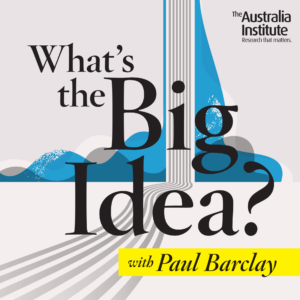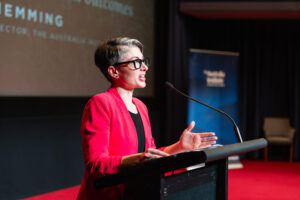Labor announced its desire to host a United Nations climate conference in the lead-up to the 2022 election. Officially called the Conference of the Parties, the UN describes its COPs as “the biggest and most important annual climate-related conferences on the planet”. They bring together nation states to negotiate on how best to tackle climate change and protect those countries that suffer the most from its impacts.
Committing to partner with Pacific nations to host the event was part of a suite of climate promises designed to show the world that, if elected, Labor would ensure Australia got serious about climate action. Despite its notional climate platform, however, what was noticeably absent from Labor’s campaign was any indication it would rein in Australia’s enormous fossil fuel expansion, despite the role it is playing in the climate crisis.
In fact, Labor was very careful to reassure the fossil fuel industry, both before and after the election, that its climate ambitions would not interfere with the industry’s ambitions. Forty-eight hours before Australia went to the polls, Madeleine King, now minister for Resources, told gas industry representatives: “I want to be clear how enthusiastic I am, and Labor is, for this industry.”
It is now more than a year since the Albanese government was elected. If the fossil fuel industry was ever worried, it certainly needn’t have been. Any pretence Labor made of seriously reducing emissions has been dropped since getting its key climate reform, the safeguard mechanism, through parliament in April.
Days after the scheme passed, official forecasts showed Australia’s fossil fuel exports would increase over at least the next five years. In the past month alone, one new coalmine has been approved, and three others failed to be rejected on climate grounds. Fracking is going ahead in the Northern Territory, with the federal government’s blessing, and there are more than 100 individual new gas and coal projects listed as “in development”.
While fossil fuels are thriving, the government’s domestic climate initiatives are languishing. Recent data shows Australia’s emissions are still steady. Despite the claims, renewable energy investment is not where it needs to be. No policies have yet been implemented to address Australia’s increasing transport emissions. The government’s carbon offset scheme – the linchpin of its climate policy – is a mess of flawed science, conflicts and cover-ups.
Despite all this, the Australian government still feels qualified, if not entitled, to play a leading role in international climate negotiations in 2026. To host what will be COP31, the government is lobbying to secure the support of the international community, both from within the relevant UN bloc as part of the COP nomination process and from the Pacific nations with which Australia plans to partner as host.
Australia has been gaming UN climate agreements for decades … It has signed pledges it has no intention of meeting, has argued consistently and successfully to water down language, and has manipulated international emissions accounting to its advantage.
In a recent senate estimates hearing, government officials said Pacific leaders had “warmly welcomed” Australia’s proposal to co-host a COP. This is true, but the use of the past tense is likely significant.
Pacific leaders may not have been so welcoming had they known then that Labor would be as enthusiastic about fossil fuel expansion as the Coalition. Seve Paeniu, Tuvalu’s minister of finance and economic development, recently reiterated that “we would only agree to the notion of framing [it] as a Pacific COP if Australia were to come on board and support the priorities of the Pacific on climate change”.
The Australian government has not acknowledged these conditions, at least not publicly.
Paeniu’s remarks come just months after the governments of Vanuatu, Tuvalu, Tonga, Fiji, Niue and Solomon Islands issued a joint resolution – the Port Vila Call for a Just Transition to a Fossil Fuel Free Pacific – that states “the Pacific will no longer accept the fossil fuel lie” and calls for a number of urgent actions to address climate change, including an end to fossil fuel subsidies and approvals.
Australia’s Foreign Affairs minister, Penny Wong, has spent the past year touring the Pacific in an attempt to salvage the strained relationships left by the previous government, and has promised the Labor government “will stand shoulder to shoulder with our Pacific family” in response to the climate crisis.
The caveat, presumably, is: just not if it means doing anything to address the very industries driving the crisis, and also not if it means forking out cash to help cope with it. Labor has maintained the Coalition’s commitment to Pacific climate finance, with about $160 million a year committed over five years – a meagre figure compared with the $11 billion in fossil fuel subsidies annually.
Australia’s bid to host the COP has attracted a small number of champions from civil society and within parliament, all excited by the idea of an Australian COP and the opportunities it will bring them. With no apparent irony, Australia’s bid has been called an “Olympic moment on climate action” by WWF Australia.
The Olympic Games are notorious for being used by nation states to sportswash their reputations, just as the COP may be for climate action. While the offences have ranged in seriousness, it’s rare to find an Olympics where public diplomacy and national branding hasn’t crossed over into outright propaganda.
Russia’s successful bid for the 2014 Olympic and Paralympic Winter Games promoted the country as uniquely suited to host the games thanks to its commitment to environmental sustainability and “stable political and economic environment”. What promised to be a “Russian renaissance” was instead characterised by multiple grievous environmental and human rights transgressions in the years leading up to the event, entirely on-brand for an authoritarian regime.
Beijing was awarded the 2022 Winter Olympics after making vague “assurances” on human rights, even though it had already failed to keep its earlier promise to make progress on human rights issues when it was awarded the 2008 Summer Olympics. While Amnesty International urged the international community to use the 2022 games as an opportunity to put pressure on China, no change was forthcoming.
In a similar vein, the idea seems to be that the COP is such a desirable, internationally significant event that the prospect of hosting will inspire or shame the Australian government into abandoning fossil fuels. Despite the number of times this strategy has demonstrably failed, supporters have taken it upon themselves to advise the government how to, in partnership with the Pacific, “deliver climate leadership” for COP31.
But the Australian government is good at marketing. It’s even better at greenwashing. Drawing on the tactics of the fossil fuel industry, it heavily promotes a vision of green hydrogen, critical minerals and Australia’s future as a “renewable energy superpower”, neglecting to mention that these things will be as well as fossil fuel expansion rather than instead of.
Looking past the rhetoric, there is no indication the government has any appetite to “deliver climate leadership”. A joint media release from Penny Wong, Minister for Climate Change Chris Bowen and Minister for the Pacific Pat Conroy seems to suggest the mere act of co-hosting a COP is enough to “help restore Australia’s reputation”.
Enlisting Pacific nations in the exercise is a cynical but potentially effective publicity strategy. Switzerland, for example, withdrew its own bid to host the COP on the basis that “these countries are particularly hard hit by the effects of climate change”. Significantly, the Australian government doesn’t need the support of all Pacific nations, either. Persuading one or two would be enough to market the event as the Pacific COP.
What genuinely may not have occurred to those excited about Australia’s bid is that Australia has been gaming UN climate agreements for decades, solely to protect its resources industry. It has signed pledges it has no intention of meeting, has argued consistently and successfully to water down language, and has manipulated international emissions accounting to its advantage.
Raising global climate ambition would not only mean a reversal of all the loopholes Australia has fought for decades to achieve. It would require our government to advocate for drastically slashing fossil fuel supply and consumption, to contradict the deeply entrenched, grim determination of successive governments to maintain fossil fuel exports.
It’s not yet clear if the rest of the world has seen that, despite a change of government and rhetoric, Australia is still a petrostate at heart. Nor is it clear whether this will deter Pacific nations and other relevant parties from supporting Australia’s bid to host COP31. Given the history of bad faith actors being given hosting rights to mega events, it’s quite possible Australia will host the COP in 2026. Perhaps the international community’s support will be a strategic manoeuvre, designed to expose Australia as a climate fraud.
Hosting the COP is neither inherently good nor bad. What is already apparent, however, is that the entire process is proving to be Australia’s Olympic moment on greenwashing, revealing the extreme contradiction between Australia’s commitment to fossil fuel expansion and the promises it makes on climate change.
Between the Lines Newsletter
The biggest stories and the best analysis from the team at the Australia Institute, delivered to your inbox every fortnight.
You might also like
Why a fossil fuel-free COP could put Australia’s bid over the edge
When the medical world hosts a conference on quitting smoking, they don’t invite Phillip Morris, or British American Tobacco along to help “be part of the solution”.
We need political courage, not caution | Polly Hemming
When it comes to solving the biggest national problems, a bit of courage leaves political caution for dead. Now’s not the time for politeness.
Integrity at home shapes global outcomes – Polly Hemming | Climate Integrity Summit 2025
Despite frequent claims that Australia is ‘too small to make a difference,’ historical evidence demonstrates our nation’s outsized role in influencing international norms and policies.



